Biblical Hebrew has been a dead language now for
2,000 years. All we can do is reconstruct the best we can with what few
incomplete discarded scripal notes, scrolls, inscriptions, etc. have
survived passed down from error-prone scribal zealots. All with
competing interests, beliefs, and oral traditions!
Worse yet, our efforts to achieve an English
version have come at the hands of transliteration over time from what
fragments we have in ancient Hebrew into Greek and from there into
Latin, and from there into English then modern Hebrew. With each
iteration of transliteration, we lose the authenticity, flavor, intent,
and context that was The Hebrew Language and Cultural Matrix of the
ancient Hebrews.

Biblical Hebrew is a dead language! The language
ceased to exist and was no longer spoken for more than 1,000 years.
https://www.biblicalarchaeology.org/daily/biblical-topics/hebrew-bible/what-is-the-oldest-hebrew-bible/
The earliest version of the complete "Old Testament" Scripture
dates back to the 10th Century AD written by the Maoretes (not
Nazarenes) and was transliterated from Greek, not ancient Hebrew. The
oldest complete OT is the Codex Leningradensis dating to the 13th
Century AD.... While the Dead Sea Scrolls date back before the first
century, they are far from complete. They are small fragments (a few
complete books) and have to be reconstructed through "educated guesses"
as to the massive missing parts to try and piece them back together.
We are constantly lied to about how the Hebrew OT
was passed down to us today. Judaism became the standard Jewish religion
but was their “Torah” the Torah used by Yahusha the Nazarene? Where and
how did we achieve the Jewish Torah? Have the scribes meticulously
maintained the Scriptures as we have been told by Judaism? We will
answer those questions in this book as well.
We are led to believe the Jewish Torah was meticulously transcribed
down through history by dedicated scribes under the threat of death for
the most minute mistep.
That could not be further from the truth!
Worse yet, far from being meticulously and in a consistent way passed
down by Jewish scribes, they were mangled by those very scribes the same
way the Catholic Church mangled the New Testament scripts. The result...
a transliterated mixture of omissions, additions, twisting, and mangling
to ensure the beliefs of the scribes were written into the text. Causing
2000 years of “interpretation” leading to a splintering of those with a
desire to know the Truth. We now have many various sects within Judaism
and hundreds of Christian denominations. This is because the "transition
of the texts from one scribe to the next was fluid".
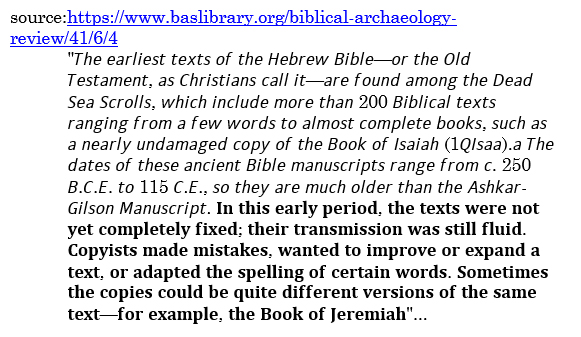
Not only are the Hebrew scriptures we read in our
Bibles today only a few hundred years old and written by scribal error
and manipulation of fragments passed down... No one speaks Biblical
Hebrew/Aramaic today. Don't fall for all those "Hebrew experts" who
claim they know better than everyone else and simply because they speak
Modern Hebrew. They are as in the dark as someone who has nothing more
than a good interlinear at their fingertips.
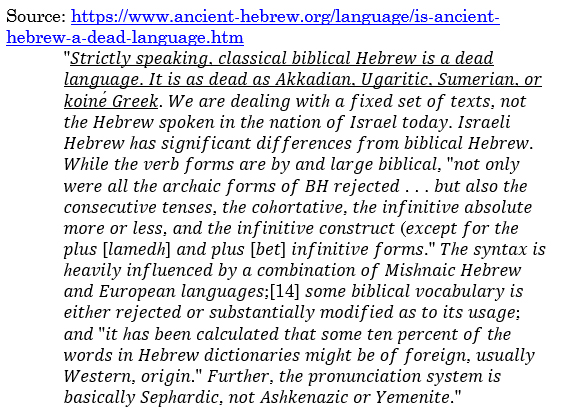
While our modern-day "Hebrew experts" in Judaism
try and convince us we have The Word of Yahuah all we need to do is
speak modern Hebrew, this is far from the truth. In fact,
transliteration from Hebrew (which itself was reconstructed from
transliterations into Greek/Latin i.e. the ) is far from a science. It
is not even an art form. It is more of a "guess" and depends on who is
doing the "guessing" from error-ridden sources and there is no standards
or systems or rules by which various "experts" transliterate from one
language to another.
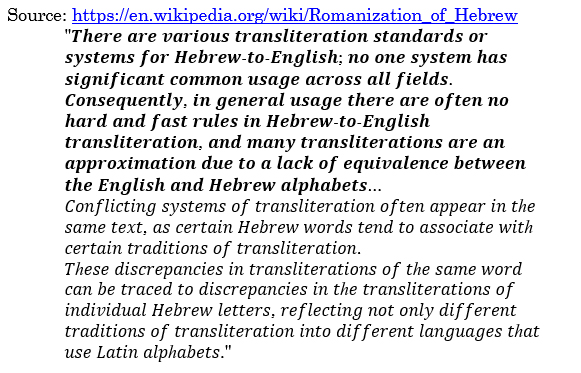
Psalm 110:4 is used to link the King of Salem to
Yahusha through some form of Divine re-incarnation carrying forward some
type of “eternal priesthood”, outside of that defined by Yahuah in
Scripture (the bloodline of Aaron through Zadok). However,
what we do not realize is the Hebrew text of that Psalm is not so
crystal clear! There are several ways of transliterating that Psalm.
Most translations that follow the Greek Old Testament (Septuagint) read
“ᴛʜᴏᴜ
ᴀʀᴇ
ᴀ Pʀɪᴇsᴛ
ꜰᴏʀᴇᴠᴇʀ
ᴀꜰᴛᴇʀ
ᴛʜᴇ ‘ᴏʀᴅᴇʀ’
ᴏꜰ Mᴇʟᴄʜɪᴢᴇᴅᴇᴋ”.
However, the 1917 translation by JPS (the most trusted source at that
time) recognized the word “order” was not what the Hebrew text implied
at all. The "experts" got it wrong across the board
for over a thousand years! The
meaning was more along the lines of a priest in the “manner” of a Melchi
(righteous) Tzedek (King). It is not referring to King David (and by
extension Yahusha) being a Priest in some other priestly order passed
down from a dead pagan King of Salem! Below is how it is translated in
the JPS 1917 Bible:
Psalm 110:4 (JPS 1917
translation of Tanakh)
Tʜᴇ
LORD ʜᴀᴛʜ
sᴡᴏʀɴ,
ᴀɴᴅ
ᴡɪʟʟ
ɴᴏᴛ
ʀᴇᴘᴇɴᴛ:
'Tʜᴏᴜ
ᴀʀᴛ
ᴀ Pʀɪᴇsᴛ
ꜰᴏʀ
ᴇᴠᴇʀ
ᴀꜰᴛᴇʀ
ᴛʜᴇ
ᴍᴀɴɴᴇʀ
ᴏꜰ Mᴇʟᴄʜɪ
Tᴢᴇᴅᴇᴋ.'
So what David was expressing is that Yahusha
would be an Eternal Priest in like ‘manner’ (or like unto) a Righteous
King. Psalm 110:4 has no significance to the King of Salem at all other
than like Sha’ul explained, there is a comparison to be drawn, but
nothing more. The new translation by JPS is far more accurate to The
Plan of Salvation or Scarlet Thread of Redemption as Yahuah made the
Promise of an Eternal Throne to David, and Eternal Priesthood to Zadok
(David's close friend and High Priest). So Yahusha would Fulfill that
Promise to the House of Zadok and be the Eternal High Priest but in the
‘manner’ of a Righteous King fulfilling the Promise to David. Yahusha
would be BOTH.
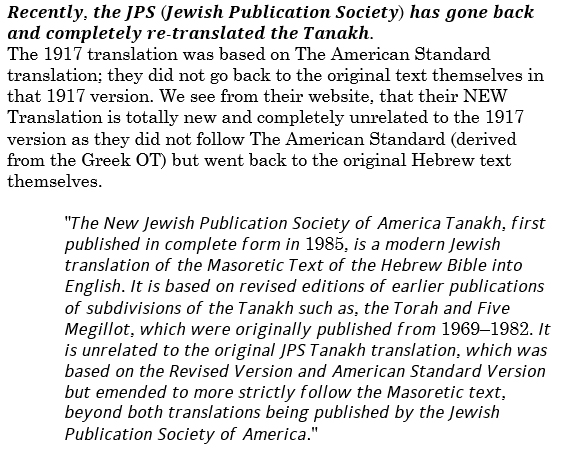
How once going back to the original language and
Masoretic text, they transliterated that Pslam below:
Psalm 110:4 (JPS 1985
version)
"You are a Priest forever a rightful king by My decree"
This one example (of many) should cause us all to
hit the pause button on the idea that "we have the Word of God IF you
speak modern Hebrew"!
This sheds some serious “New Light” on this
teaching of an external “Melchizedek Priesthood”! Because what David
said has nothing to do with the King of Salem or some external pagan
priesthood outside of Aaron called "The Melchizedek Priesthood" which
relies 100% on a MISTRANSATION of Psalm 110:4. Yahuah was simply telling
Yahusha that he was the Fulfillment of the Promise to the House of Zadok
line of Aaronic High Priest, NOT some mythical extra-Biblical priesthood
based on re-incarnation of an Ancient King!
The word translated “priest” in that verse is
Hebrew ‘kohen’ ("כהן").
The term ‘kohen’ bears the connotation of priesthood, also servitude to
the deity, and, less frequently, RULERSHIP! We see this in (II Sam.
8:18): "and David's sons were kohanim (chief officers not priests)".
Below are a few examples of this interesting variation in
transliteration:
2 Samuel 8:18 (KJV)
Aɴᴅ
Bᴇɴᴀɪᴀʜ
ᴛʜᴇ sᴏɴ
ᴏꜰ Jᴇʜᴏɪᴀᴅᴀ
ᴡᴀs
ᴏᴠᴇʀ
ʙᴏᴛʜ
ᴛʜᴇ Cʜᴇʀᴇᴛʜɪᴛᴇs
ᴀɴᴅ
ᴛʜᴇ Pᴇʟᴇᴛʜɪᴛᴇs;
ᴀɴᴅ Dᴀᴠɪᴅ's
sᴏɴs
ᴡᴇʀᴇ
ᴄʜɪᴇꜰ
ʀᴜʟᴇʀs
(ᴋᴏʜᴇɴɪᴍ).
2 Samuel 20:26 (KJV)
Aɴᴅ
Iʀᴀ,
ᴀʟsᴏ
ᴛʜᴇ Jᴀɪʀɪᴛᴇ,
ᴡᴀs
ᴀ
ᴄʜɪᴇꜰ
ʀᴜʟᴇʀ
(ᴋᴏʜᴇɴ)
ᴀʙᴏᴜᴛ
Dᴀᴠɪᴅ.
1 Kings 4:5 (KJV)
Aɴᴅ
Aᴢᴀʀɪᴀʜ
ᴛʜᴇ sᴏɴ
ᴏꜰ Nᴀᴛʜᴀɴ
ᴡᴀs
ᴏᴠᴇʀ
ᴛʜᴇ
ᴏꜰꜰɪᴄᴇʀs:
ᴀɴᴅ Zᴀʙᴜᴅ
ᴛʜᴇ sᴏɴ
ᴏꜰ Nᴀᴛʜᴀɴ
ᴡᴀs
ᴘʀɪɴᴄɪᴘᴀʟ
ᴏꜰꜰɪᴄᴇʀ
(ᴋᴏʜᴇɴ)
ᴀɴᴅ
ᴛʜᴇ
ᴋɪɴɢ's
ꜰʀɪᴇɴᴅ.
The FIRST definition of Kohen is not ‘priest’ but
“Chief Ruler” i.e. KING! Also note, that Kohen can also be a Priest of
OTHER RELIGIONS (such as Salem):
H3548 ‘Kohen’ - Strong’s: chief ruler, own, priest,
prince, principal officer. 2) priests of other religions
When speaking of the Hebrew word
"kohen", Christian translators translated as "priest" in Psalm 110:4, it
is often translated as "ruler" in many places in Christian translations.
The Hebrew word is kohen and while commonly translated as "priest" it
may have other meanings. The word appears 750 times in the Masoretic
Text. In 5 cases the KJV translates it as "officers". Therefore, Psalm
110:4 could read:
Psalm 110:4
Yᴏᴜ
ᴀʀᴇ
ᴀ
RULER
ꜰᴏʀᴇᴠᴇʀ,
ᴀ Rɪɢʜᴛꜰᴜʟ
Kɪɴɢ
ʙʏ Mʏ
Dᴇᴄʀᴇᴇ.
This is the intent as it was spoken about King
David (and by extension the Messiah), not the dead Priest/King of Salem.
Getting back to my recent post on "us" and "our"
in Genesis 1:26. A brother made the comment:
"𝑌𝑜𝑢
𝑎𝑟𝑒
𝑚𝑖𝑠𝑠𝑖𝑛𝑔
𝑡ℎ𝑒
𝑝𝑙𝑢𝑟𝑎𝑙
𝑓𝑜𝑟𝑚
𝑜𝑓
𝑡ℎ𝑒
𝑣𝑒𝑟𝑏
𝑎𝑓𝑡𝑒𝑟
𝑒𝑙𝑜ℎ𝑖𝑚
𝑖𝑛
𝑣𝑒𝑟𝑠𝑒
26,
𝑎𝑠
𝑤𝑒𝑙𝑙
𝑎𝑠
𝑡ℎ𝑒
𝑝𝑙𝑢𝑟𝑎𝑙
𝑝𝑜𝑠𝑠𝑒𝑠𝑠𝑖𝑣𝑒
𝑜𝑓
𝑡ℎ𝑒
𝑖𝑚𝑎𝑔𝑒
𝑎𝑛𝑑
𝑙𝑖𝑘𝑒𝑛𝑒𝑠𝑠.
𝑇ℎ𝑖𝑠
𝑖𝑠
𝑤ℎ𝑦
𝑡ℎ𝑒
𝑈𝑆
𝑎𝑛𝑑
𝑂𝑈𝑅
𝑚𝑢𝑠𝑡
𝑒𝑥𝑖𝑠𝑡.
𝐻𝑒𝑏𝑟𝑒𝑤
𝑔𝑟𝑎𝑚𝑚𝑎𝑟
𝑑𝑒𝑚𝑎𝑛𝑑𝑠
𝑡ℎ𝑖𝑠."
"Hebrew grammar demands this"? I am not
sure I agree. Sounds more like a "guess" to me... The "experts" say
"most likely derived" ... in other words "we really aren't sure."
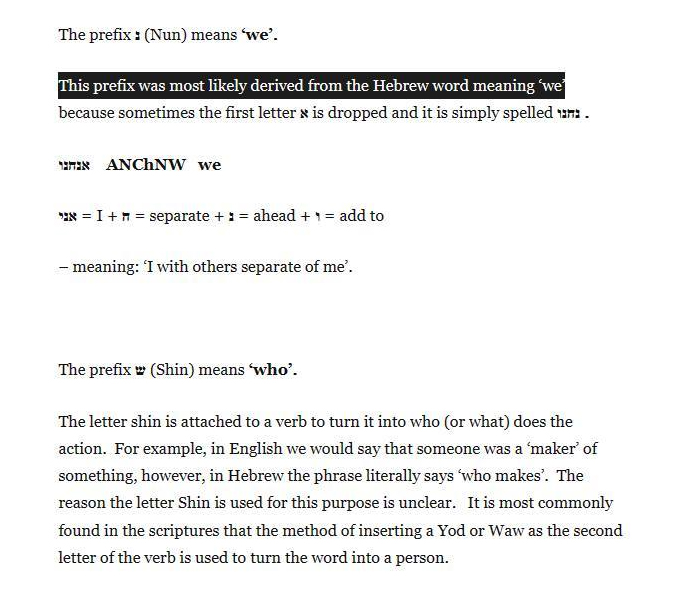
We cannot make a statement like "Biblical Hebrew
demands it" because that language has been dead for 2000 years and then
transliterated through 4 dead languages based on error-ridden fragments
by opportunist Hellenized Jewish Scribes no earlier than the 10th
Century CE. Based on what we know, the best we can say is "most
likely"... I don't know about you, but "most likely" is far from "Hebrew
demands it" and FAR from good enough for me in my search for
understanding.
As I showed in example 1 Psalm 110:4 our
so-called Hebrew experts never went back to Hebrew at all and used the
Greek OT to arrive at a completely bogus translation for over over 1,000
years before JPS finally decided to get it right. In our English Bibles,
Genesis 1:26-27 reads:
Genesis
1:26-27
26 Tʜᴇɴ
Gᴏᴅ sᴀɪᴅ,
"Lᴇᴛ
ᴜs
ᴍᴀᴋᴇ
ᴍᴀɴ
ɪɴ
ᴏᴜʀ
ɪᴍᴀɢᴇ,
ɪɴ
ᴏᴜʀ
ʟɪᴋᴇɴᴇss,
ᴀɴᴅ
ʟᴇᴛ
ᴛʜᴇᴍ
ʀᴜʟᴇ
ᴏᴠᴇʀ
ᴛʜᴇ
ꜰɪsʜ
ᴏꜰ
ᴛʜᴇ sᴇᴀ
ᴀɴᴅ
ᴛʜᴇ
ʙɪʀᴅs
ᴏꜰ
ᴛʜᴇ
ᴀɪʀ,
ᴏᴠᴇʀ
ᴛʜᴇ
ʟɪᴠᴇsᴛᴏᴄᴋ,
ᴏᴠᴇʀ
ᴀʟʟ
ᴛʜᴇ
ᴇᴀʀᴛʜ,
ᴀɴᴅ
ᴏᴠᴇʀ
ᴀʟʟ
ᴛʜᴇ
ᴄʀᴇᴀᴛᴜʀᴇs
ᴛʜᴀᴛ
ᴍᴏᴠᴇ
ᴀʟᴏɴɢ
ᴛʜᴇ
ɢʀᴏᴜɴᴅ.”
27 Sᴏ
Gᴏᴅ
ᴄʀᴇᴀᴛᴇᴅ
ᴍᴀɴ
ɪɴ
ʜɪs
ᴏᴡɴ
ɪᴍᴀɢᴇ,
ɪɴ
ᴛʜᴇ
ɪᴍᴀɢᴇ
ᴏꜰ Gᴏᴅ
ʜᴇ
ᴄʀᴇᴀᴛᴇᴅ
ʜɪᴍ;
ᴍᴀʟᴇ
ᴀɴᴅ
ꜰᴇᴍᴀʟᴇ
ʜᴇ
ᴄʀᴇᴀᴛᴇᴅ
ᴛʜᴇᴍ.
Is this accurate or did the translators falsify the text by adding
words and twisting existing words to write the doctrine of the Trinity
into the text?
I will prove the proper translation of this text from Hebrew to English
is:
Genesis 1:26-27
Tʜᴇɴ
Eʟᴏʜɪᴍ
(𝑡ℎ𝑖𝑠
𝑖𝑠
𝑡ℎ𝑒
𝑙𝑎𝑠𝑡
𝑝𝑜𝑖𝑛𝑡
𝑜𝑓
𝑐𝑙𝑒𝑎𝑟
𝑐𝑜𝑛𝑡𝑒𝑥𝑡,
𝑌𝑎ℎ𝑢𝑎ℎ
- Genesis 2:8) sᴀɪᴅ,
"Lᴇᴛ
ᴍᴀɴᴋɪɴᴅ
ʙᴇ
ᴍᴀᴅᴇ
ɪɴ
ᴛʜᴇ
ɪᴍᴀɢᴇ
ᴀɴᴅ
ʟɪᴋᴇɴᴇss
ᴏꜰ
ᴇʟᴏʜɪᴍ
(𝑠𝑜𝑛𝑠
𝑜𝑓
𝐺𝑜𝑑 – Psalm 82:6),
ᴀɴᴅ
ʟᴇᴛ
ᴍᴀɴᴋɪɴᴅ
ʀᴜʟᴇ
ᴏᴠᴇʀ
ᴛʜᴇ
ꜰɪsʜ
ᴏꜰ
ᴛʜᴇ
sᴇᴀ
ᴀɴᴅ
ᴛʜᴇ
ʙɪʀᴅs
ᴏꜰ
ᴛʜᴇ
ᴀɪʀ,
ᴏᴠᴇʀ
ᴛʜᴇ
ʟɪᴠᴇsᴛᴏᴄᴋ,
ᴏᴠᴇʀ
ᴀʟʟ
ᴛʜᴇ
ᴇᴀʀᴛʜ,
ᴀɴᴅ
ᴏᴠᴇʀ
ᴀʟʟ
ᴛʜᴇ
ᴄʀᴇᴀᴛᴜʀᴇs
ᴛʜᴀᴛ
ᴍᴏᴠᴇ
ᴀʟᴏɴɢ
ᴛʜᴇ
ɢʀᴏᴜɴᴅ.”
27 Sᴏ
Yᴀʜᴜᴀʜ
ᴄʀᴇᴀᴛᴇᴅ
ᴍᴀɴ
ɪɴ
ʜɪs
ᴏᴡɴ
ɪᴍᴀɢᴇ
(genesis 2:8, Psalm 82:6),
ɪɴ
ᴛʜᴇ
ɪᴍᴀɢᴇ
ᴏꜰ
ᴇʟᴏʜɪᴍ
(𝑎𝑠
𝑠𝑜𝑛𝑠)
ʜᴇ
(𝑠𝑖𝑛𝑔𝑙𝑢𝑎𝑟)
ᴄʀᴇᴀᴛᴇᴅ
ʜɪᴍ;
ᴍᴀʟᴇ
ᴀɴᴅ
ꜰᴇᴍᴀʟᴇ
ʜᴇ
(𝑠𝑖𝑛𝑔𝑙𝑢𝑎𝑟)
ᴄʀᴇᴀᴛᴇᴅ
ᴛʜᴇᴍ.
I will prove textually and in the context that
Yahuah singularly is the creator and that the plural nature of the word
"elohim" used in this verse is referring to the family of Yahuah or
"sons of God" or "mankind" NOT a plurality of creator gods.
Elohim is in the Bible 2,598 times and 2,596
times it is translated as “God” referring to Yahuah or “gods” referring
to the sons of Yahuah or messengers (Angles). Elohim can be singular or
plural depending on the context. We indicate the singular use with a
capital E and the plural use with a small e. So Yahuah is Elohim and His
sons are elohim in English. Or God and gods in the Hellenized sense of
the words. The only two times Elohim is not translated as “God” or "sons
of God".. is in Genesis 1:26 where all of a sudden Elohim is translated
as “us” and “our”! A Clear red flag that the lying pen of the scribe has
struck yet again to deceive!
𝑱𝒆𝒓𝒆𝒎𝒊𝒂𝒉
8:8
"'Hᴏᴡ ᴄᴀɴ ʏᴏᴜ sᴀʏ, "Wᴇ ᴀʀᴇ ᴡɪsᴇ, ꜰᴏʀ ᴡᴇ ʜᴀᴠᴇ ᴛʜᴇ ʟᴀᴡ ᴏꜰ Yᴀʜᴜᴀʜ,"
ᴡʜᴇɴ ᴀᴄᴛᴜᴀʟʟʏ ᴛʜᴇ ʟʏɪɴɢ ᴘᴇɴ ᴏꜰ ᴛʜᴇ sᴄʀɪʙᴇs ʜᴀs ʜᴀɴᴅʟᴇᴅ ɪᴛ ꜰᴀʟsᴇʟʏ?
Now, when you look at the Hebrew Interlinear the
words "us" and "our" were added by scribes (in error as I will prove).
Under the English words above that are actually in Hebrew, you see “Noun
or Verb”. The other words without a Hebrew word under them are scribal
additions. The only English words are “said, God, make, man, image,
likeness” in Hebrew. There are only 6 words in the original Hebrew texts
and 14 English words in the transliterated result. 8 words were added by
the translators. Now, I admit when going from Hebrew to English there is
a need to add words, so that is not the issue. The issue is, did they do
the text justice and follow the standard rules of translation? Or did
they deviate from the rules of translation here to build in a false
pagan doctrine?
Let “us” find out (pun intended).
First,
we need to understand what those “rules” that govern proper translation
are! The rules that govern translation ensure that the words we have to
add in English are correct and in context. Context is what must be kept
at all costs, contradictions resolved, tense of words kept in agreement.
All violated this one verse! We must keep the Textual Context,
Historical Context, Scriptual Context, and Spiritual Context to properly
understand in English was it said in Hebrew in any single verse. We must
NEVER "sound bite" a verse out of context and build an entire doctrine
out of context (basically all of Christianity falls into this category).
To keep “Textual Context” in translation, we look around the portion of
scripture in question for the last point in the text around it where
“context” is clearly established. Everything after that point is within
THAT context until there is another point of clear context change.
First, let’s read Genesis 1:26 as it would read in Hebrew using just
the 6 Hebrew words in the original text. Those 6 Hebrew words are:
𝒘𝒂𝒚·𝒚𝒐̄·𝒎𝒆𝒓...
’𝒆̆·𝒍𝒐̄·𝒉𝒊̂𝒎...
𝒏𝒂·‘𝒂̆·𝒔́𝒆𝒉...
’𝒂̄·𝒅̱𝒂̄𝒎...
𝒃ə·𝒔̣𝒂𝒍·𝒎𝒆̂·𝒏𝒖̄...
𝒌𝒊𝒅̱·𝒎𝒖̄·𝒕̱𝒆̂·𝒏𝒖̄
and literally, it reads "said Elohin make man image likeness" when
transliterated into English. We (the translators) have to add some words
to make it make sense. To do that, we look for the last point of clear
context... The context set above is that of “Elohim” with a capital "E"
referring to Yahuah Elohim. This is clearly documented in context:
𝑮𝒆𝒏𝒆𝒔𝒊𝒔
2:7-8
Nᴏᴡ ᴛʜᴇ LORD Gᴏᴅ (𝗬𝗮𝗵𝘂𝗮𝗵
𝗘𝗹𝗼𝗵𝗶𝗺)
ʜᴀᴅ ᴘʟᴀɴᴛᴇᴅ ᴀ ɢᴀʀᴅᴇɴ ɪɴ ᴛʜᴇ ᴇᴀsᴛ, ɪɴ Eᴅᴇɴ; ᴀɴᴅ ᴛʜᴇʀᴇ ʜᴇ ᴘᴜᴛ ᴛʜᴇ ᴍᴀɴ
ʜᴇ ʜᴀᴅ ꜰᴏʀᴍᴇᴅ.
There was no "us" or "our" as there was NO OTHER
GOD with Him at creation, he did all by himself.
𝑰𝒔𝒂𝒊𝒂𝒉
44:24
24 “Tʜɪs ɪs ᴡʜᴀᴛ Yᴀʜᴜᴀʜ sᴀʏs— ʏᴏᴜʀ Rᴇᴅᴇᴇᴍᴇʀ, ᴡʜᴏ ꜰᴏʀᴍᴇᴅ ʏᴏᴜ ɪɴ ᴛʜᴇ
ᴡᴏᴍʙ: I ᴀᴍ Yᴀʜᴜᴀʜ, ᴛʜᴇ Mᴀᴋᴇʀ ᴏꜰ ᴀʟʟ ᴛʜɪɴɢs, ᴡʜᴏ sᴛʀᴇᴛᴄʜᴇs ᴏᴜᴛ ᴛʜᴇ
ʜᴇᴀᴠᴇɴs, ᴡʜᴏ sᴘʀᴇᴀᴅs ᴏᴜᴛ ᴛʜᴇ ᴇᴀʀᴛʜ ʙʏ ᴍʏsᴇʟꜰ.
𝑰𝒔𝒂𝒊𝒂𝒉
45:5-18
5 I ᴀᴍ Yᴀʜᴜᴀʜ, ᴀɴᴅ ᴛʜᴇʀᴇ ɪs ɴᴏ ᴏᴛʜᴇʀ; ᴀᴘᴀʀᴛ ꜰʀᴏᴍ ᴍᴇ ᴛʜᴇʀᴇ ɪs ɴᴏ Gᴏᴅ.
7 I ꜰᴏʀᴍ ᴛʜᴇ ʟɪɢʜᴛ ᴀɴᴅ ᴄʀᴇᴀᴛᴇ ᴅᴀʀᴋɴᴇss, I ʙʀɪɴɢ ᴘʀᴏsᴘᴇʀɪᴛʏ ᴀɴᴅ
ᴄʀᴇᴀᴛᴇ ᴅɪsᴀsᴛᴇʀ; I, Yᴀʜᴜᴀʜ, ᴅᴏ ᴀʟʟ ᴛʜᴇsᴇ ᴛʜɪɴɢs. 12 Iᴛ ɪs I ᴡʜᴏ ᴍᴀᴅᴇ
ᴛʜᴇ ᴇᴀʀᴛʜ ᴀɴᴅ ᴄʀᴇᴀᴛᴇᴅ ᴍᴀɴᴋɪɴᴅ ᴜᴘᴏɴ ɪᴛ. Mʏ ᴏᴡɴ ʜᴀɴᴅs sᴛʀᴇᴛᴄʜᴇᴅ ᴏᴜᴛ
ᴛʜᴇ ʜᴇᴀᴠᴇɴs; I ᴍᴀʀsʜᴀʟᴇᴅ ᴛʜᴇɪʀ sᴛᴀʀʀʏ ʜᴏsᴛs. 18 Fᴏʀ ᴛʜɪs ɪs ᴡʜᴀᴛ
Yᴀʜᴜᴀʜ sᴀʏs— Hᴇ ᴡʜᴏ ᴄʀᴇᴀᴛᴇᴅ ᴛʜᴇ ʜᴇᴀᴠᴇɴs, Hᴇ (ᴀʟᴏɴᴇ) ɪs Gᴏᴅ; Hᴇ ᴡʜᴏ
ꜰᴀsʜɪᴏɴᴇᴅ ᴀɴᴅ ᴍᴀᴅᴇ ᴛʜᴇ ᴇᴀʀᴛʜ, Hᴇ ꜰᴏᴜɴᴅᴇᴅ ɪᴛ; Hᴇ ᴅɪᴅ ɴᴏᴛ ᴄʀᴇᴀᴛᴇ ɪᴛ ᴛᴏ
ʙᴇ ᴇᴍᴘᴛʏ, ʙᴜᴛ ꜰᴏʀᴍᴇᴅ ɪᴛ ᴛᴏ ʙᴇ ɪɴʜᴀʙɪᴛᴇᴅ— Hᴇ sᴀʏs: "I ᴀᴍ Yᴀʜᴜᴀʜ, ᴀɴᴅ
ᴛʜᴇʀᴇ ɪs ɴᴏ ᴏᴛʜᴇʀ (Gᴏᴅ)."
So Yahuah cleared that up with His declarations
over and over (the above a just a sampling of many more) that He alone
is God, He is singular, and created all things by Himself. That
overturns the twisted translations of Genesis 1:26 that added "us" and
"our" to the text! So literally it should have been properly translated
as:
𝑮𝒆𝒏𝒆𝒔𝒊𝒔
1:26-27
Tʜᴇɴ Yahuah (𝑮𝒆𝒏𝒆𝒔𝒊𝒔
2:8) sᴀɪᴅ, "Lᴇᴛ ᴍᴀɴᴋɪɴᴅ ʙᴇ ᴍᴀᴅᴇ ɪᴍᴀɢᴇ ʟɪᴋᴇɴᴇss,
Many "Hebrew experts" will point out that the word "elohim" in this
verse is plural which is why they added "us" and "our" to the text to
indicate the plurality of the term "elohim". However, as I stated
earlier", the word "elohim" can be singular or plural referring to
Elohim (Yahuah) or elohim (sons of Yahuah). We read in Genesis 2:7 that
it was Yahuah Elohim, singular, who created mankind. Therefore, the
plural nature of the word "elohim" in
𝑮𝒆𝒏𝒆𝒔𝒊𝒔
1:26-27 refers to "mankind" which was mistranslated as singular "man" in
error. It is MANKIND plural that was created in the image of elohim.
Again, it was "I" singular who said "you/mankind" are elohim, sons of
the Most High (singular).
𝑷𝒔𝒂𝒍𝒎
82:6
“I sᴀɪᴅ, ‘Yᴏᴜ ᴀʀᴇ “ɢᴏᴅs"; ʏᴏᴜ ᴀʀᴇ ᴀʟʟ sᴏɴs ᴏꜰ ᴛʜᴇ Mᴏsᴛ Hɪɢʜ.’
Given the clear context of Scripture, the
declaration of Yahuah, and the actual Hebrew words and definitions below
is the proper translation into English:
𝑮𝒆𝒏𝒆𝒔𝒊𝒔
1:26-27
Tʜᴇɴ Yahuah Eʟᴏʜɪᴍ (𝑮𝒆𝒏𝒆𝒔𝒊𝒔
2:7-8) sᴀɪᴅ, "Lᴇᴛ ᴍᴀɴᴋɪɴᴅ ʙᴇ ᴍᴀᴅᴇ ɪɴ ᴛʜᴇ ɪᴍᴀɢᴇ ᴀɴᴅ ʟɪᴋᴇɴᴇss ᴏꜰ
ᴇʟᴏʜɪᴍ (𝑠𝑜𝑛𝑠
𝑜𝑓
𝐺𝑜𝑑
-
𝑷𝒔𝒂𝒍𝒎𝒔
82:6), ᴀɴᴅ ʟᴇᴛ ᴍᴀɴᴋɪɴᴅ ʀᴜʟᴇ ᴏᴠᴇʀ ᴛʜᴇ ꜰɪsʜ ᴏꜰ ᴛʜᴇ sᴇᴀ ᴀɴᴅ ᴛʜᴇ ʙɪʀᴅs
ᴏꜰ ᴛʜᴇ ᴀɪʀ, ᴏᴠᴇʀ ᴛʜᴇ ʟɪᴠᴇsᴛᴏᴄᴋ, ᴏᴠᴇʀ ᴀʟʟ ᴛʜᴇ ᴇᴀʀᴛʜ, ᴀɴᴅ ᴏᴠᴇʀ ᴀʟʟ ᴛʜᴇ
ᴄʀᴇᴀᴛᴜʀᴇs ᴛʜᴀᴛ ᴍᴏᴠᴇ ᴀʟᴏɴɢ ᴛʜᴇ ɢʀᴏᴜɴᴅ.” 27 Sᴏ Yᴀʜᴜᴀʜ ᴄʀᴇᴀᴛᴇᴅ ᴍᴀɴ ɪɴ
ʜɪs ᴏᴡɴ ɪᴍᴀɢᴇ (𝑮𝒆𝒏𝒆𝒔𝒊𝒔
2:8,
𝑷𝒔𝒂𝒍𝒎𝒔
82:6), ɪɴ ᴛʜᴇ ɪᴍᴀɢᴇ ᴏꜰ ᴇʟᴏʜɪᴍ (𝑎𝑠
𝑠𝑜𝑛𝑠)
ʜᴇ (𝑠𝑖𝑛𝑔𝑙𝑢𝑎𝑟)
ᴄʀᴇᴀᴛᴇᴅ ʜɪᴍ; ᴍᴀʟᴇ ᴀɴᴅ ꜰᴇᴍᴀʟᴇ ʜᴇ (𝑠𝑖𝑛𝑔𝑙𝑢𝑎𝑟)
ᴄʀᴇᴀᴛᴇᴅ ᴛʜᴇᴍ.
The translators twisted the text in Genesis 1:26
to support their own pagan beliefs in a Trinitarian “Godhead”. They
ignored the clear context of “Elohim” which is the singular form
referring to the MOST HIGH, Yahuah Elohim. They added the words “us” and
“our” in error, ignoring the clear scriptural context that Yahuah alone
created mankind confirmed in the original Hebrew and in the very next
verse. In doing so; they were able to “build into the text” the pagan
doctrine of the Trinity and make Genesis contradict itself from one
verse 26 to the very next verse 27 which clearly says He created man in
His image! Confirmed in Psalms 82:6 that says “I” singular created man
in the image of “elohim” plural meaning gods in the image of The Most
High (singular).
So in verse 26, the tense of the Creator is said
to be plural then in verse 27 the tense of the Creator is singular! They
would not pass 3rd-grade English classes with that one! The plural tense
in verse 26 refers to lowercase elohim or "mankind" not the Creator.
Verse 27 is accurate. Genesis 1:26 is a case study of the errors
inherent in transliteration from 4 dead languages (Biblical Hebrew into
Latin, then Greek, then Old English) finally into modern English and
modern Hebrew. Whew! I'm exhausted already.
Not only is the "word-for-word" transliteration
not based on any provable fact as we are dealing with DEAD languages,
but we can be 100% certain verse 26 is in grave error as it violates
clear declarations from the Creator Yahuah Himself that HE ALONE created
man all by Himself. And verse 26 "we" and "our" contradict the very next
verse 27 which uses the singular pronoun "He created" which is in
context and accurate to the rest of the Scriptures.
The question we must, if we are being honest, ask ourselves is this:
"𝑫𝒐
𝒘𝒆
𝒕𝒓𝒖𝒔𝒕
𝒂𝒏
𝒊𝒎𝒑𝒐𝒔𝒔𝒊𝒃𝒍𝒆
𝒘𝒐𝒓𝒅-𝒇𝒐𝒓-𝒘𝒐𝒓𝒅
𝒕𝒓𝒂𝒏𝒔𝒍𝒊𝒕𝒆𝒓𝒂𝒕𝒊𝒐𝒏
𝒐𝒓
𝒃𝒖𝒊𝒍𝒅
𝒐𝒖𝒓
𝒖𝒏𝒅𝒆𝒓𝒔𝒕𝒂𝒏𝒅𝒊𝒏𝒈
𝒐𝒏 "𝒊𝒏𝒕𝒆𝒏𝒕
𝒂𝒏𝒅
𝒄𝒐𝒏𝒕𝒆𝒙𝒕"?
Ok Sha'ul, so we don't know without a doubt what
ancient Biblical Hebrew said in any one specific verse. At best, we have
educated guesses by teams of modern intellectuals forcing a round peg
(ancient Hebrew) into a square hole (modern Hebrew). How then are we to
have any confidence in what the Scriptures say today vs what was
actually written in ancient times?
Taking Scriptural “sound bites” and stringing
them all together out of context to create an implied doctrine or simply
taking one verse and claiming it is "word-for-word" is folly. These
doctrines are always easy to identify because they violate clear
explicit doctrine (sound doctrine). Anytime an implied doctrine is
formulated that contradicts explicit Scriptures, we must reject that
doctrine as our “understanding” is flawed.
I have put together my "rules of translating" the
Scriptures to ensure there is NO contradiction and no sound-biting out
of context while keeping the intent of the text throughout.
-
Yahuah reveals His Word progressively over time through Prophets
not “committees/teams” of human experts!
-
Focus should be on the destination language, not the source
language.
-
The most important aspect of handling The Word of Yahuah is
anointing.
-
Never translate one language to the next word-for-word!
-
The Bible is written in dead languages, no one speaks those
languages today, therefore there are no “experts.”
Wisdom and understanding of Yahuah's Word, Will,
Purpose, and Plan come through His anointed men who teach... not
committees of intellectual "experts".
𝑴𝒂𝒕𝒕𝒉𝒆𝒘
23:34
Tʜᴇʀᴇꜰᴏʀᴇ
I ᴀᴍ
sᴇɴᴅɪɴɢ
ʏᴏᴜ
ᴘʀᴏᴘʜᴇᴛs
ᴀɴᴅ
sᴀɢᴇs
ᴀɴᴅ
ᴛᴇᴀᴄʜᴇʀs.
Sᴏᴍᴇ
ᴏꜰ
ᴛʜᴇᴍ
ʏᴏᴜ
ᴡɪʟʟ
ᴋɪʟʟ
ᴀɴᴅ
ᴄʀᴜᴄɪꜰʏ;
ᴏᴛʜᴇʀs
ʏᴏᴜ
ᴡɪʟʟ
ꜰʟᴏɢ
ɪɴ
ʏᴏᴜʀ
sʏɴᴀɢᴏɢᴜᴇs
ᴀɴᴅ
ᴘᴜʀsᴜᴇ
ꜰʀᴏᴍ
ᴛᴏᴡɴ
ᴛᴏ
ᴛᴏᴡɴ.
One of the major failures of all translation
efforts in human history is they are done by “committee”. A team of
self-absorbed “experts” who are not Nazarenes and certainly not anointed
by the Throne of Creation for the task.
Anytime you have a team of so-called “experts”
every decision in translation is done by committee. The resulting
translation is a severely compromised version required to come to a
consensus among the experts. Compromises to get their approval bringing
in their existing misconceptions, false doctrines, and so forth.
There should be one… only one anointed prophet of
Yahuah, a true Nazarene at the heart of the effort qualified and gifted
to bring the text from one language to another and honor the Nazarene
authors of the originals. One anointed to understand The Mystery
Language the Scriptures are written in and gifted in the destination
language to make this language easily understood in the resulting
translation. Trained by
Yahuah over the course of a lifetime for this most important of all
callings. Daniel spoke of these "men of wisdom" to come at
the end to fix "the Lying Pen of the Scribe"...
𝑴𝒂𝒕𝒕𝒉𝒆𝒘 23:34
Tʜᴇʀᴇꜰᴏʀᴇ
I ᴀᴍ
sᴇɴᴅɪɴɢ
ʏᴏᴜ
ᴘʀᴏᴘʜᴇᴛs
ᴀɴᴅ
sᴀɢᴇs
ᴀɴᴅ
ᴛᴇᴀᴄʜᴇʀs.
Sᴏᴍᴇ
ᴏꜰ
ᴛʜᴇᴍ
ʏᴏᴜ
ᴡɪʟʟ
ᴋɪʟʟ
ᴀɴᴅ
ᴄʀᴜᴄɪꜰʏ;
ᴏᴛʜᴇʀs
ʏᴏᴜ
ᴡɪʟʟ
ꜰʟᴏɢ
ɪɴ
ʏᴏᴜʀ
sʏɴᴀɢᴏɢᴜᴇs
ᴀɴᴅ
ᴘᴜʀsᴜᴇ
ꜰʀᴏᴍ
ᴛᴏᴡɴ
ᴛᴏ
ᴛᴏᴡɴ.
In every past translation effort, the focus is
not on the destination language (which is the point of the effort) but
on the original languages. This is a major error in any translation
effort. The “originals” are already written! What is being created is in
the destination language. That is the focus of any good modern-day
translation effort. The existing texts of the Scriptures are already
written, and we have 2,000 years of “experts” explaining, exploring, and
defining those texts and the structure of those languages.
We have reference material at our disposal that
these past translators did not have, we have interlinear references to
show the structure and how it was translated, dictionaries,
commentaries, etc. Those are “the experts” required in the original
languages. I have more knowledge at the end of my mouse click (the
Internet) than all the translators who ever worked on any translation
over the past 2,000 years COMBINED…
That is where the Truth is found. It should be
done independent of any “commissioning organization” or any outside
influence… by a singular anointed servant sent by Yahuah to restore The
Word of His Testimony just like Yahuah has done throughout history
called PROPHETS. Not “committees”.
We have all purchased goods from Wal-Mart made in
China. Opened them up to assemble them and the instructions made no
sense whatsoever in English.
https://www.buzzfeed.com/nataliemorin/chinese-signs-that-got-seriously-lost-in-tranlsation?utm_term=.gfL9RbK8l#.lx5b0wGlQ
This is because the translators putting it into
English did not speak English as their first language. Instead, they
simply put together a word-for-word translation from Chinese into
English… the result is confusing and sometimes ridiculous and the
“intent and meaning” of the instructions are lost in translation.
Why do I bring this up? That is exactly what
every translation team attempted for 2,000 years. They misunderstood
“don’t add to or subtract from” to mean “the words” and tried to just
translate each word from Hebrew/Greek into a word in English. This is a
complete violation of the main principle in any translation effort. The
MOST IMPORTANT member of the translation team is the expert in the
destination language. The sentence structure in one language never
matches the sentence structure in another language, the words don’t
match up “one to one”, and the figures of speech, idioms, metaphors, and
so forth are not shared from one language/cultural matrix to the next.
When you simply translate word-for-word you get a
confusing and many times misleading result. This is what we have today
in our English Bibles. The Hebraic flavor, figures of speech, meaning,
and intent are lost as the translators put together a word-for-word
translation and ignore the intent, context, and language/cultural matrix
from one language to the next.
The Word was transliterated from Greek into "Old
English" yet ANOTHER dead language long before Modern Hebrew came along.
Ancient Hebrew is to Modern Hebrew what Old English is to Modern
English! Let me illustrate.
John Locke in a 1692 publication,
wrote... "I fear, that the jumbling of those good
and plausible words in your head... might a little jargogle your
thoughts..."
Why do I mention this? Not one person reading
that statement who speaks English knows what he just said. Speaking
today’s modern English is no help at all as “Old English” is a dead
language. The words are no longer used and the way the sentences are
structured makes no sense to us today.
From
https://en.oxforddictionaries.com/usage/old-fashioned-language
Some words that were common in the past are no
longer in ordinary use but remain in our stock of words. Many
dictionaries divide this type of vocabulary into two categories.
𝗔𝗿𝗰𝗵𝗮𝗶𝗰
Words and expressions described as archaic
are those which haven’t been in everyday use for a century or more. Some
dictionaries describe such terms as ‘old use’, or ‘old-fashioned use’.
You are unlikely to hear anyone using these terms in everyday
conversation or to come across them in modern writing, but you will
encounter them in the literature of the past.
This category of vocabulary is sometimes used
to give a deliberately old-fashioned effect, for example in historical
novels. Some writers also use it to amuse people.
Examples:
- bedroom/bedchamber
-
frighten/affright
-
perhaps/peradventure
- willing/fain
𝗗𝗮𝘁𝗲𝗱
Words and expressions described as dated may
still be used occasionally, especially by older people, but they are no
longer used by most English speakers. Here are some examples of dated
words:
Examples:
- boyfriend/beau
-
educated/lettered
- hurry/make haste
-
nonsense/bunkum
- your/thine
-
you/thee
Hmmm.... a little "jargogle" for thought from one
of the "foundations of the English Bible" the original King James...
Widely regarded as the "inerrant word of God"...
O ye Corinthians, our mouth is open unto you, our heart is
enlarged. Ye are not straitened in us, but ye are straitened in your
own bowels. Now for a recompense in the same, (I speak as unto my
children,) be ye also enlarged. (2
𝑪𝒐𝒓
6:11-13,
𝑲𝑱𝑽)
He runneth upon him, even on his neck, upon the thick bosses of
his bucklers: Because he covereth his face with his fatness, and
maketh collops of fat on his flanks. (𝑱𝒐𝒃
15:26,27,
𝑲𝑱𝑽)
He that is surety for a stranger shall smart for it: and he that
hateth suretiship is sure. (𝑷𝒓𝒐𝒗
11:15,
𝑲𝑱𝑽)
In measure, when it shooteth forth, thou wilt debate with it: he
stayeth his rough wind in the day of the east wind. (𝑰𝒔𝒂𝒊𝒂𝒉
27:8,
𝑲𝑱𝑽)
For the LORD shall judge his people, and repent himself for his
servants, when he seeth that their power is gone, and there is none
shut up, or left. (𝑫𝒆𝒖
32:36,
𝑲𝑱𝑽)
Take his garment that is surety for a stranger: and take a
pledge of him for a strange woman. (𝑷𝒓𝒐𝒗
20:16)
Whoso privily slandereth his neighbour, him will I cut off: him
that hath an high look and a proud heart will not I suffer. (𝑷𝒔𝒂
101:5)
Or if there be any flesh, in the skin whereof there is a hot
burning, and the quick flesh that burneth have a white bright spot,
somewhat reddish, or white; (𝑳𝒆𝒗
13:24)
And Elisha came again to Gilgal: and there was a dearth in the
land; and the sons of the prophets were sitting before him: and he
said unto his servant, Set on the great pot, and seethe pottage for
the sons of the prophets. (2
𝑲𝒊
4:38)
I "almost" rest my case with that bit of
"jargogle".
To all those who say speaking modern Hebrew is
the same language as Biblical Aramaic… wise up. The language spoken by
the writers of the Bible is a DEAD language and not the same language as
modern Hebrew the same thing for Greek/Latin… all DEAD. The character
set is all that is similar, the words they used are obsolete and so are
the sentence structures and the common knowledge they shared within that
2000-year-old language and cultural matrix!
Scholars have demonstrated all written texts have
been altered over time by scribes. The New Testament comes under
scrutiny by Judaism which claims it is a work of “fiction”. They point
out the following facts about the texts in what is called The New
Testament:
-
No original autographed copies
-
No known authors assembled over time hundreds of years removed
-
Additions and alterations by the scribes
-
Miracles parallels of other pagan gods
-
Contradictions
-
New doctrines and truths – “Anything true in the NT isn't new and
anything new isn't true”
In the next couple of chapters, we are going to
hold the Tanakh to that same standard. Will it pass the test, or can the
same criticism of the New Testament also apply to the Tanakh?